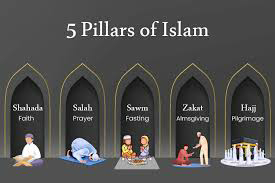THE FIVE PILLARS OF ISLAM: A FOUNDATION FOR MUSLIM BELIEF AND PRACTICE
Introduction:
Islam, one of the world's major religions, is built upon five fundamental pillars that serve as the core principles of faith and practice for Muslims. These pillars provide a strong foundation for believers to establish a deep connection with Allah and guide them in leading a righteous and fulfilling life. In this article, we will explore each of the five pillars of Islam, understanding their significance and the role they play in the lives of Muslims.
1. Shahada (Faith):
The Shahada, or the declaration of faith, is the first and most important pillar of Islam. It is a simple yet profound statement that declares the belief in the oneness of Allah and the prophethood of Muhammad (peace be upon him). By reciting the Shahada sincerely, a person enters the fold of Islam, affirming their commitment to the Islamic faith and accepting its teachings. The Shahada serves as a constant reminder of the unity and sovereignty of Allah and the central role of Prophet Muhammad as the final messenger.
2. Salah (Prayer):
Salah, or ritual prayer, is the second pillar of Islam and serves as a means of direct communication between a believer and Allah. Muslims are obligated to perform five daily prayers at specific times throughout the day. These prayers involve physical movements, recitation of verses from the Quran, and supplication. Salah not only serves as a form of worship but also fosters discipline, mindfulness, and spiritual connection, reminding Muslims of their duty to Allah and their dependence on His guidance.
3. Zakat (Charity):
Zakat, the third pillar of Islam, emphasizes the importance of giving to those in need. Muslims who possess wealth above a certain threshold are required to give a portion of their wealth to the less fortunate. This act of charity purifies the soul, promotes social justice, and helps to alleviate poverty and inequality within the Muslim community. Zakat serves as a means of sharing one's blessings and acknowledging that all wealth ultimately belongs to Allah.
4. Sawm (Fasting):
Sawm, or fasting, is observed during the holy month of Ramadan, the ninth month of the Islamic lunar calendar. Muslims abstain from food, drink, and other physical needs from dawn until sunset, focusing on self-discipline, self-reflection, and spiritual growth. Fasting during Ramadan is not only a way to demonstrate devotion to Allah but also a means of developing empathy, gratitude, and self-control. It is a time of heightened worship, increased charity, and a deeper connection with the Quran.
5. Hajj (Pilgrimage):
Hajj, the fifth pillar of Islam, is a pilgrimage to the holy city of Mecca in Saudi Arabia. It is obligatory for Muslims who are physically and financially able to undertake this journey at least once in their lifetime. The Hajj rituals commemorate the actions of Prophet Abraham and his family and symbolize unity, equality, and submission to Allah. The pilgrimage is a transformative experience, bringing Muslims from diverse backgrounds together to fulfill their spiritual obligations and seek forgiveness and blessings from Allah.
Conclusion:
The five pillars of Islam provide Muslims with a comprehensive framework for their faith and practice. These pillars serve as a constant reminder of the core beliefs and values of Islam, fostering a deep connection with Allah and guiding Muslims in their daily lives. By adhering to these pillars, Muslims strive to lead a life of righteousness, compassion, and devotion, ultimately seeking closeness to Allah and eternal salvation.
#bilaljimaga #engrbillz #BILLZNETWORKING







Comments
Post a Comment